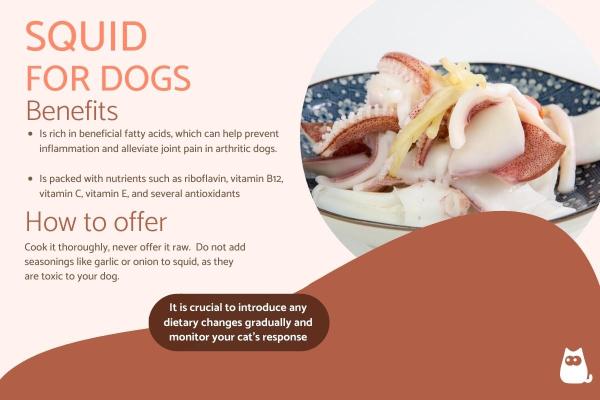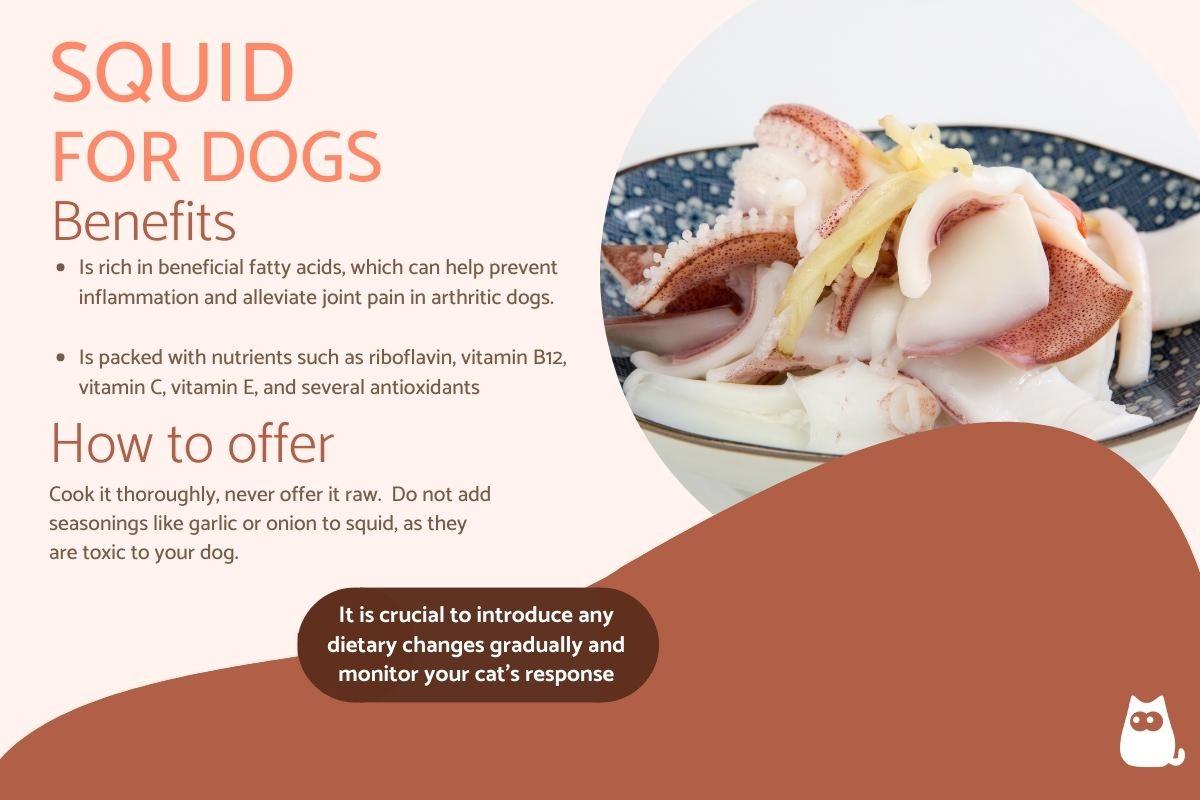Can Dogs Eat Squid?



See files for Dogs
As the importance of nutrition gains more recognition, people are increasingly considering natural alternatives or exploring the idea of sharing their food with their dogs. This shift in perspective raises questions about which foods are suitable for a dog's diet. It is understandable to have doubts when it comes to including certain foods in a dog's diet, as some common pantry ingredients can be harmful or potentially fatal for them.
In the following AnimalWised article, we aim to clarify whether dogs can eat squid and provide valuable insights on the topic.
Can dogs eat squid?
Dogs can safely eat squid as part of their diet. As carnivores, dogs require a protein-rich diet primarily derived from animal tissues, such as meat and fish. Squid, being a type of decapod cephalopod mollusk, falls within the category of fish and can serve as a valuable protein source for dogs.
In fact, squid offers various potential benefits for dogs, such as being a good source of lean protein, vitamins, and minerals like vitamin B12, potassium, and phosphorus. However, while dogs can technically consume squid, it's essential to exercise caution and moderation.
For squid to be safe for dogs to consume, it is vital to serve it without any added seasonings, oils, or sauces. While these may enhance the flavor for humans, they can be detrimental to dogs. Ingredients like garlic, onions, and certain spices commonly used in human cooking can be toxic to dogs and should be avoided.
You might be interested in this other article, where we explain if dogs are carnivores or omnivores.
Benefits of squid for dogs
Squid offers several benefits for dogs due to their nutritional composition. Here are some advantages of including squid in a dog's diet:
- High-quality protein: squid provides dogs with animal proteins that are rich in essential amino acids, which are crucial for their overall health. These proteins support muscle development, repair tissues, and contribute to various physiological functions in the body.
- Low fat content: squid has a low fat content, making it suitable for dogs that have weight-related issues such as obesity, overweight, or a tendency to gain weight. It allows caregivers to provide a protein source without excessive calorie intake.
- Essential vitamins: squid contains vitamins that are beneficial for dogs, including vitamin E and vitamin B3 (niacin). These vitamins contribute to the proper functioning of the canine body, supporting immune system health, promoting cell function, and aiding in energy metabolism.
- Vital minerals: squid is a good source of minerals essential for dogs, such as phosphorus, selenium, iron, and iodine. These minerals play vital roles in various physiological processes, including bone health, enzyme function, oxygen transport, and thyroid regulation.
- Omega-3 fatty acids: squid is particularly rich in polyunsaturated fatty acids, specifically omega-3 fatty acids. These fatty acids are highly recommended for dogs as they contribute to maintaining healthy skin and a lustrous coat. Omega-3 fatty acids also possess anti-inflammatory properties and support cardiovascular health and brain function.
Learn more by reading this other article on the best omega-3 rich food for dogs.
How to give squid to dogs?
When it comes to giving squid to dogs, it's important to choose the right form and preparation method. It is recommended to offer squid to dogs in its most natural form, without the addition of fats, salt, flour, sauces, or other ingredients that are not suitable for them. This ensures that they receive the maximum nutritional benefits without any potential harmful additives.
Before cooking squid for dogs, ensure they are properly cleaned or purchase them already cleaned. Remove any internal organs, beak, and ink sac. Thoroughly rinse the squid to eliminate any remaining impurities.
Opt for cooking methods that retain the nutritional value of the squid while avoiding excessive oil or additives. Cooking options such as baking, grilling, or boiling are suitable for preparing squid for dogs. These methods help preserve the natural flavors and nutrients without adding unnecessary fats or calories.
When introducing squid to your dog's diet, observe their reaction and monitor for any signs of digestive discomfort or allergies. Every dog is unique, and individual sensitivities may vary.

What is the recommended amount of squid for dogs?
The amount of squid to be included in a dog's diet depends on various factors, including the dog's individual nutritional needs, overall health, and the guidance of a dog nutrition professional.
If you choose to feed your dog homemade food, it is recommended to consult with a professional to determine the appropriate quantities and frequency of adding squid to their menu. They can provide personalized recommendations based on your dog's specific requirements.
On the other hand, if your dog consumes commercial food such as dry kibble, canned food, or dehydrated food, squid can be offered as an occasional treat rather than a regular part of their diet. Treats should be given in moderation to avoid excessive calorie intake and to ensure that the dog's main nutritional needs are met by their regular food.
As a general guideline, squid should only make up a small portion of your dog's overall diet. Squid should be treated as a supplemental protein source and should not replace the primary protein sources in your dog's diet, such as meat or high-quality dog food.
The appropriate amount and frequency of including squid or any other food in your dog's diet should be determined by a professional.
Contraindications of squid in dogs
While squid can be a suitable addition to a dog's diet, it's important to be aware of potential contraindications and take necessary precautions. Here are some considerations:
Just like humans, dogs can develop allergies or sensitivities to certain foods, including squid. It is advisable to introduce a small amount of squid and closely observe your dog for any adverse reactions. If any discomfort or allergic symptoms are observed, such as itching, digestive issues, or skin problems, it's best to avoid offering squid again. Substitute foods with similar properties can be considered as alternatives.
If your dog has any pre-existing health conditions that require a special diet prescribed by a veterinarian, it's crucial to consult with them before introducing squid or any new food, even as a treat. For example, dogs with urate crystals may require a low-purine diet, and while squid contains moderate amounts of purines, it's important to follow the veterinarian's guidance to ensure the dog's health is not compromised.
Lear more about urate crystals in dogs in this other article.

Side effects of squids in dogs
When dogs consume squid, there is a possibility of experiencing certain side effects or digestive discomfort. These may include:
- Some dogs may experience discomfort or mild pain in the abdominal area after consuming squid.
- Squid may cause an upset stomach in certain dogs, leading to symptoms like indigestion, gas, or bloating.
- Digestive upset from squid consumption can result in loose or watery stools in dogs.
- In some cases, dogs may feel nauseous or even vomit after eating squid.
It's important to note that the severity and manifestation of these side effects can vary depending on factors such as the amount of squid consumed and the individual dog's tolerance. If your dog exhibits any of these symptoms after eating squid, it is advisable to discontinue feeding them this food and monitor their condition. If the symptoms persist or worsen, it is recommended to consult a veterinarian for further evaluation and guidance.
Don't miss out on this additional article that delves into the topic of healthy diets for dogs.
If you want to read similar articles to Can Dogs Eat Squid?, we recommend you visit our Homemade diets category.
- Stevenson and Rutgers. Nutritional management of canine urolithiasis . Royal Canin.







